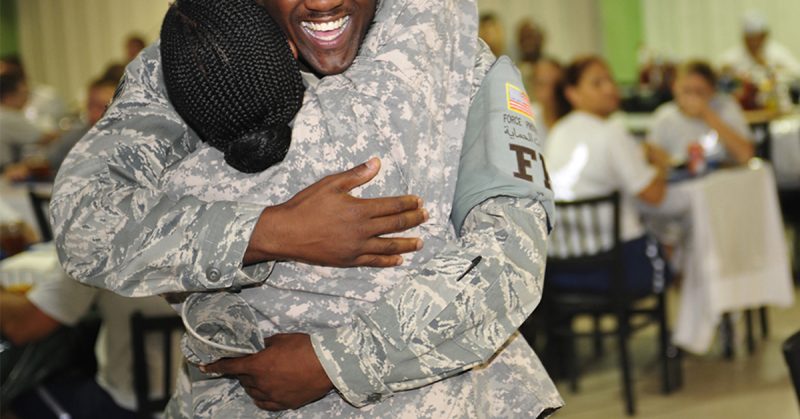As the wife of a reservist JAG, for a while I was confused about what exactly my husband did and by military life in general. There is so much to keep up with – acronyms (seems like there is one for everything), ranks, uniforms, when to wear a cover, when to salute. Add to that the fact that my husband is a lawyer, so I had no idea what he was doing for a living at each posting. After the initial newness of Army life settled down, I decided it would be a good idea to try to learn as much as I could about military life and structure. Based on what I’ve learned so far, I’ll share tips for learning about your service member’s career and why it’s important to understand their day to day.
The most important thing to understand is that if your spouse is in the military, so are you. You may not have served, or ever will in an official way, but supporting your military spouse is service. The way I came to see it, I owed it to myself and to our partnership to learn about this. Viewing your partnership in this way can enrich your military experience and help you experience a different connection to your spouse. Here are some simple ways you can begin.
The first thing to understand is the ranking system. Understanding the hierarchy, what the designations on the uniforms stand for, how promotions work, and what responsibilities go with each is the first step to understanding the bigger picture of military life. Knowing where your spouse wants to go in their career and what needs to happen for them to get there can help you both plan on how to do it together.
Second, learn and study the acronyms. There is an acronym for everything, and it is likely that your spouse will use them when talking with you about their day. If you have no idea what they are talking about, how are you going to have a conversation? Ask what the acronyms stand for and what they mean, and don’t be afraid to ask more than once if you find yourself getting mixed up. I had to do this over and over until I started to remember them. This can also be helpful in social situations where acronyms will be used, as you will be able to follow the conversation and not feel left out.
Third, at each posting, find out exactly what your spouse will be doing in their day to day. Depending on what that is, you might need them to explain it in layman’s terms. I’m not a lawyer, so there are a lot of things my husband does daily that I don’t understand. But I have the overall gist, which helps me understand enough to talk to him about it. Learning what your spouse does will help you learn how to best help them when things are tough at work. It will allow you to give some advice, be compassionate or just be a sounding board for them.
Actively participating in your military life and working to understand what your spouse does shows them that you are supportive of their choice to serve. Hopefully, your military spouse is also taking the time to understand what it is you do and what happens in your day-to-day life. To support each other, it is essential to understand each other, and it goes both ways.





“The most important thing to understand is that if your spouse is in the military, so are you.” This is the quote that is being shown for this article across social media, and is, therefore, sending entirely the wrong message. Military spouses may serve, but are not in the military, and do not serve more than other spouses who are supporting their partners in any other profession.
I do agree that being educated about the military helps, the Navy has volunteers who run COMPASS classes for spouses, and I know there is something similar for the Marine Corps. There are also command volunteers to help bridge the gap between the command and the family – Air Force calls them Key Spouses, and for the Navy they are Ombudsmen. These people will help navigate military life. However, as a spouse it’s not necessary to know all the ranks, and knowing when and where salutes are given and what cover to wear is my spouse’s problem not mine (although I do walk on his left when he’s in uniform, just in case).
The day to day stuff should come out quite naturally in normal conversation between two people in a close relationship, and is not peculiar to the military. The only difference maybe if your spouse works in an area that needs a higher security clearance, and in that case you won’t know what goes on, but that’s exactly the same for my profession where there are things I can’t discuss outside of work due to a non-disclosure agreement.
The military is not the only profession where a spouse maybe away for long periods of time with minimal communication. It is not even the only profession where mortal danger may be encountered on a daily basis. Being a military spouse is just like being any other spouse – to make our relationship work I have to support my husband, just as he supports me!
Echoing what Claire commented here: my spouse is in the military. Not me.
Do I know my spouse spends a lot of time in the motor pool moaning about inefficient leadership practices? Yeah. Do I know most of these young guys he works with subsist on nicotine, Redbull and grade school fart jokes? Also yes.
And honestly, that’s enough for me. It’s not like he knows the ins-and-outs of what I do as a writer. That’s my job, not his.